Gender equality: Women empowerment in sports and science
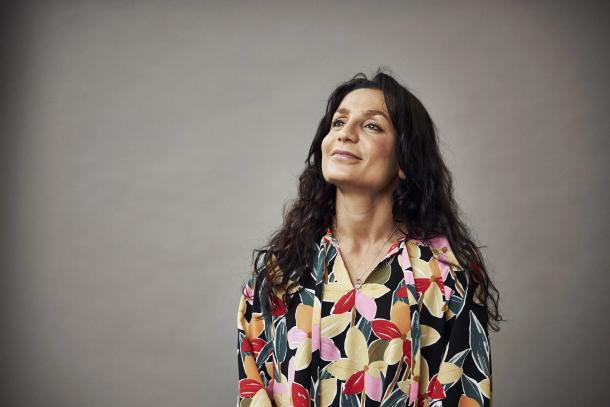
Empowering women: Unleash the opportunities
Nadia Nadim’s striking life story brought her from Afghanistan to a refugee camp in Denmark, then on to career as an elite footballer and, now, a qualified doctor. She is also UNESCO Champion for Girls’ and Women’s Education.
After growing up in a country where women were not allowed to leave the house without a male relative, Nadia Nadim fought adversity and discrimination in order to pursue her dreams. Her experience of losing freedom under the Taliban and living in poverty in a refugee camp in Denmark fueled her intense desire to succeed.
Football saved me from being this poor outsider kid and made me get accepted.
Once her family’s asylum request was granted by Denmark, where girls are empowered to play sports, Nadim’s professional career took off.
Today, Nadim has become a role model for many girls and women who aspire to emancipate and unleash their potential against gender norms and discrimination.
Gender equality starts in the classroom
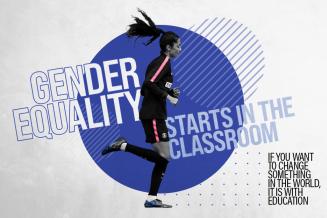
With the ongoing deterioration of the security situation in Afghanistan, violence and instability have prevented many women and girls from accessing schools and education. More recently the attitude of Taliban leaders toward female education is seriously impacting the enrollment of female students and their opportunities for success.
I was born on the 2nd of January 1988 in Herat, Afghanistan, where I was raised by my mother and father, together with my four sisters. When I was young, I got the heartbreaking news that the Talibans had executed my father. After that, my family decided to escape Afghanistan, as it was not a safe place for a family of six women.
Too many girls and women around the world are still held back by social norms and traditional school practices that limit their educational right and opportunities. Yet, their education is the most powerful investment to make for society’s collective future.
During the Covid-19 pandemic, school closures have exacerbated girls’ and women’s unpaid care work, limiting the time to learn at home. Amid this unprecedented disruption to education, UNESCO estimates that 11 million girls may not return to school. Girls aged 12-17 are at particular risk of dropping out of school in low and lower-income countries.
Without schools as safe spaces, adolescent girls are at increased risk of gender-based violence, early marriage and unintended pregnancy, as well as sexual exploitation and abuse.
Nadim became UNESCO Champion for Girls’ and Women’s Education in 2019 after deciding to put her heart and notoriety at the service of girls and women everywhere.
For me, education is very important. If you want to change something in the world, it is with education. There are many children who can’t study or go to school. I hope this will change because if you want to change something, it will be with school, she said.
Her education, our future is UNESCO’s mission to accelerate action for girls’ and women’s education by leveraging political and financial commitments, as well as leadership for women and girls. It will contribute to the UNESCO Strategy for Gender Equality in and through Education (2019-2025) and its three pillars aiming for better data to inform action for gender equality in and through education; better legal, policy and planning frameworks to advance rights; and better-quality learning opportunities to empower girls and women.
Girls’ emancipation through sport
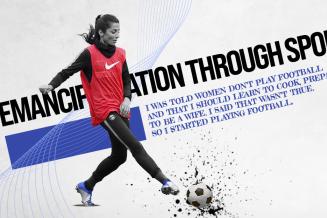
The positive impact that sports can have on the emancipation of young girls and women has been acknowledged for decades.
Participating in sports can help break-down gender stereotypes, improve girls’ and women’s self-esteem and contribute to the development of leadership and strategic thinking skills.
Women in sport break down the misperception they are weak or incapable.
The fact that certain political or religious groups wish to continue to prohibit or restrict the practice of women or the presence of women in stadiums testifies to the importance and social influence of sport.
It was thanks to the Iran-Spain match during the 2018 FIFA World Cup that the Iranian women were able, for the first time since 1979, to officially enter the stadiums. This is an example of sport – football, in this case – as an accelerator of social change in favor of the freedom of young girls and women.
We were smuggled to Denmark, where I lived in a refugee camp for six months. One day I saw a young girl play football. I knew what it was, but I had never seen girls play. I didn’t even know it was something I could do. When I saw this girl play, I was like, wow! I want to play this game. Now I’m here.
She began playing for local teams in Denmark and made her debut with the national team in 2009, going to play with high profile teams such as Manchester City and Paris Saint-Germain.
To support girls and women like Nadia Nadim, UNESCO has kickstarted programs to enforce their right for girls and women to participate in physical education, physical activity and sports at all levels. These missions also aim to protect participating girls and women from harassment, misconduct and abuse, as well as use sport to promote gender equality and empower girls and women.
With UNESCO’s support, the Global Observatory for Women, Sport, Physical Education and Physical Activity has been established as an incubating association in Lausanne, Switzerland.
It aims to overcome global and systemic inequalities for girls and women in sport. For example, in Europe, 45% of men play sport at least once a week compared to 37% of women.
I was told women don’t play football and that there were other things set out for me. I should learn to cook, I should prepare to be a wife. That was the life people were expecting for me. I said that wasn’t true. So I started playing football.
Tackling the gender bias in sport
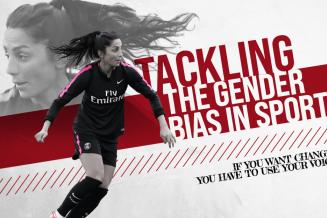
In 1924, women made up just 4% of all Olympic athletes. A lot has changed since then. Today, women athletes compete regularly and many of them become elite sportswomen. Indeed, a century later, the Paris 2024 Olympic Games are set to achieve full gender balance in the number of participating athletes for the first time in Olympic history.
Still, one thing that has not changed is media interest.
There are still a lot of differences and a lot of inequalities. Most people are interested in the men’s game and don’t have a clue about what’s happening on the women’s side. But that’s changing. From when I started until now, there’s been a huge change in the women’s game and that’s in the right direction. If you want change, you have to use your voice. It’s going to happen, but it won’t happen overnight.
Women only get 4% of sports media coverage, and of that coverage, their physical appearance, family life and love life are referenced more than their athletic ability, while men are depicted as powerful, independent and valued as athletes.
This is due to the low percentage of women in sports journalism. Even though this field has become more accessible to women, numbers show that there is still a noticeable gap. Currently, a low percentage of sports broadcasters are women, while the number of women who enter into sports journalism is still relatively low. This particular area of reporting remains a predominantly male-dominated specialty in countries all over the world.
#HerMomentsMatter is a spinoff of UNESCO’s World Radio Day campaign promoting fairer coverage of women athletes. It encourages participants to share videos and images of sportswomen on your social networks and help raise awareness for fairer coverage of women athletes.
In order to promote gender equality in media coverage, UNESCO’s Communication and Information mission has spearheaded many initiatives to empower women and girls, such as the development of Gender-Sensitive Indicators for Media (GSIM) and the promotion of gender-sensitive educational resource policies.
Smashing the glass ceiling for women in science
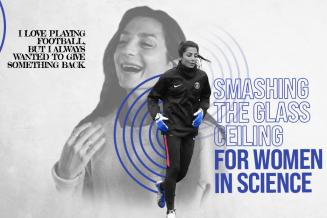
While playing as a professional footballer, Nadim decided to pursue studies in the medical field. She has since graduated from Aarhus University in Denmark with a medical degree, focusing on reconstructive surgery. When her sports career eventually ends, Nadim aims to join Doctors Without Borders, the international humanitarian medical non-governmental organization known for its projects in conflict zones and in countries affected by endemic diseases.
Nadim’s profile as a professional athlete will help her acquire a platform to raise awareness about the lack of medical resources in many countries around the world.
I am going to have a platform as a doctor so I can reach out to people who are in need. I love playing football, but I always wanted to give something back. Being able to do it as a doctor is going to be different than what I’ve been doing as a footballer.
Yet, for many women attempting a career in science there are many hurdles to overcome, and that even before they attempt to balance work and family life.
Often, a male-dominated culture prevents some women from even considering leadership positions in academia or from being satisfied with their achievements.
Throughout the years, women working in science, technology, engineering and mathematics (STEM) have been faced with a significant gender gap in these disciplines all over the world. Even though women have made major progresses towards increasing their participation in higher education, they are still under-represented in these fields.
According to the UNESCO Institute for Statistics, less than 30% of the world’s researchers are women. Women who are active in STEM fields publish less, are paid less for their research and do not progress as far as men in their careers.
Achieving gender equality in STEM is not just a matter of fairness or a basic human right. The fact there are many brilliant girls and women who might be interested in STEM, but choose to pursue careers elsewhere because of the various obstacles they may face, is a lost opportunity – both for women themselves as well as for the society as a whole.
UNESCO has worked to highlight and support the work of women scientists around the world by recognizing the excellence of their work.
The L’Oréal-UNESCO For Women in Science International Awards are presented every year to five outstanding women scientists – one per each of the following regions: Africa and the Arab States, Asia and the Pacific, Europe, Latin America and the Caribbean, North America – in recognition of their scientific accomplishments. The scientific fields considered for the awards alternate every other year between Life Sciences and Physical Sciences, Mathematics and Computer Science.
To encourage women in the early stages of their science career, UNESCO and L’Oréal has also launched the International Rising Talents initiative, which selects the 15 most promising women scientists among the 275 national and regional fellows of the L’Oréal-UNESCO for Women In Science programme. As these young women represent the future of science, recognizing their excellence will help ensure that they reach their full potential.
L'Oreal-UNESCO for Women in Science programme
Women empowerment: Making the equality dream come true
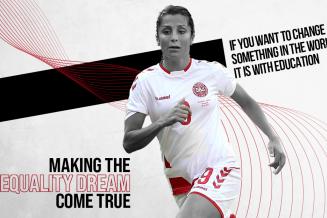
The continued marginalization and under-utilization of women’s talents, expertise and resources across the world represents a serious loss of opportunity for society as a whole, not just for the women who are left by the wayside.
Keep believing in yourself, even though there is going to be a lot of people telling you not to. And secondly, remember always to have a dream. Because these are the things that have always been with me. First of all, I dreamt. And secondly, I believed my dreams would come true.
The Covid-19 crisis has disproportionately affected women. They are on the frontline of the pandemic while conservative forces attempt to undermine the rights acquired after decades of progress.
Against this backdrop, the full participation of women in social, cultural and economic development – and in democratic processes at all levels – is a moral imperative, a matter of human rights and a political priority of the highest order.
Generation Equality is a landmark global initiative supported by UNESCO which is driving commitments in six thematic areas – Action Coalitions – that include gender equality to foster significant and lasting change for generations of women to come.

